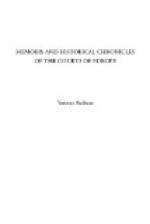As soon as the sun rises, we repair to the mountain you see before us, at the foot of which flows a stream of the most limpid water, which meanders in graceful windings through that meadow—enamelled with the loveliest flowers. We gather the most fragrant of them, which we carry and lay upon the altar, together with various fruits, which we receive from the bounty of Faraki. We then sing his praises, and execute dances expressive of our thankfulness, and of all the enjoyments we owe to this beneficent deity. The highest of these is that which love produces, and we testify our ardent gratitude by the manner in which we avail ourselves of this inestimable gift of Faraki. Having left the temple, we go into several shady thickets, where we take a light repast; after which, each of us employs himself in some unoppressive labour. Some embroider, others apply themselves to painting, others cultivate flowers or fruits, others turn little implements for our use. Many of these little works are sold to the people, who purchase them with eagerness. The money arising from this sale forms a considerable part of our revenue. Our morning is thus devoted to the worship of God and to the exercise of the sense of Sight, which begins with the first rays of the sun. The sense of Taste is gratified by our dinner, and we add to it the pleasure of Smell. The most delicious viands are spread for us in apartments strewed with flowers. The table is adorned with them, and the most exquisite wines are handed to us in crystal goblets. When we have glorified God, by the agreeable use of the palate, and the olfactory nerve, we enjoy a delightful sleep of two hours, in bowers of orange trees, roses, and myrtles. Having acquired a fresh store of strength and spirits, we return to our occupations, that we may thus mingle labour with pleasure, which would lose its zest by long continuance. After our work, we return to the temple, to thank God, and to offer him incense. From thence we go to the most delightful part of the garden, where we find three hundred young girls, some of whom form lively dances with the younger of our monks; the others execute serious dances, which require neither strength nor agility, and which only keep time to the sound of musical instruments.




